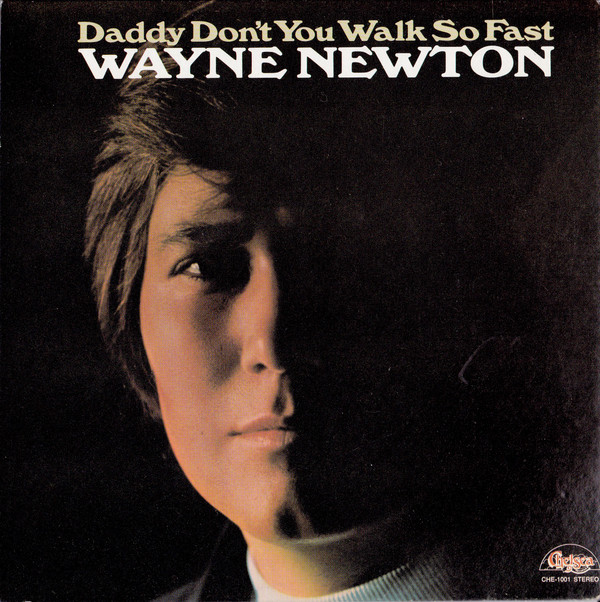
Some things I can’t defend. These things are often called guilty pleasures. Like “beach party” movies. Other things are hard to defend but not impossible. Now, these are the things that are inherently good, of high quality, but through the years they’ve acquired a patina, a coating of a transformative substance that renders their greatness obsolete or at least not easily recognizable to the general public, to the casual listener or viewer. Perhaps it’s something that is just so embedded in the cultural fabric that it becomes misunderstood or under-appreciated; think Elvis Presley or the song “Rock Around the Clock”.
Sometimes the coating that something takes on can obscure that thing’s inherent quality. For example, for people of my age, the song “Bohemian Rhapsody” had come to represent the film Wayne’s World which is a crime because Queen’s masterpiece is stunning to listen to. I think this coating idea could apply to Wayne Newton.
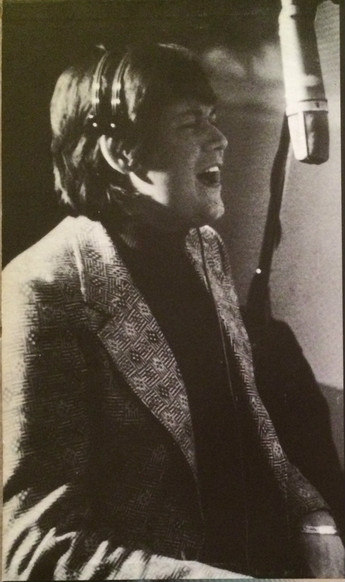
Carson Wayne Newton was born in 1942 in Norfolk, Virginia. His parents were both half Native American. Wayne’s connection with Las Vegas started early; in his junior year of high school, a Vegas booking agent saw Wayne performing in his act with his brother on a local television show. He was soon championed by the likes of Lucille Ball, Bobby Darin, Jackie Gleason and Jack Benny and landed a recording contract with Capitol Records. Although his recordings ran second to his residencies in the desert, Wayne released many quality albums for Capitol. But this was the mid-1960’s and singers like Wayne, Jack Jones, Matt Monro and John Gary were finding it hard to make inroads on the charts. And there was something else about Wayne. Something about his voice. Without opening a can of worms, let us just say that – and this is part of the coating that makes Wayne Newton seem a certain way to modern ears – the timbre of Wayne’s voice is unique. Some would say it’s an odd voice. But I like his voice. And one thing’s for sure; cat could swing like a mother. For proof, listen to him sing “But Not for Me”, “Strangers in the Night” and “Shangri-La”. Another part of this coating is the fact that Wayne has never left Las Vegas. Unlike Tom Jones who has regained his once-hobbled stature in the music world, the fact that Wayne is still “Mr. Las Vegas” somehow diminishes him in the modern public eye.
Wayne spent the ’60’s releasing albums featuring either the ‘hits of the day’ or gospel or Christmas music or live recordings. Then he was courted by the fledgling Chelsea Records company. Chelsea began at the start of 1972 and was founded by Wes Farrell. Farrell was prolific throughout the ’60’s, co-writing and/or producing such hits as “Boys”, “Hang On, Sloopy”, “Come a Little Bit Closer”, “Come On Down to My Boat” and “Indian Lake” and was also the man behind the music of the television show The Partridge Family from 1970 to 1974.

Wayne Newton – 29 years old – was the first artist that Farrell brought on board and the recording of the Daddy Don’t You Walk So Fast album began when the label was but weeks old. Farrell assembled a stellar group of musicians to play on the record. Legendary Wrecking Crew drummer Hal Blaine is the first musician listed in the liner notes. Hal has played on more hit records than any other musician in history. Take a look at my article on him here. The rest of the musicians were seasoned session men who had played in pop and jazz settings with the likes of Elvis Presley, the Beach Boys, the Monkees, Lalo Schifrin and Stan Kenton.
The strings and horns were arranged by Mike Melvoin who also played all the excellent piano on the album. Farrell made a wise choice in the talented Melvoin; indeed the earthy, gospel sound of the record can be credited to Melvoin’s soulful touch. Melvoin got his start in jazz in the early ’60’s working with such artists as Gerald Wilson, Joe Williams, Peggy Lee, Herb Ellis and Plas Johnson. Mike soon found work as a session musician and made notable appearances on the Beach Boys’ seminal Pet Sounds and on Frank Sinatra’s “That’s Life”. He also worked with artists that varied from the Jackson 5 to Tom Waits. Wes Farrell had hired him to be the musical director of The Partridge Family TV show. Mike had a daughter, Wendy, who played in Prince’s Revolution and he died of cancer in 2012. His work on Daddy gives the record its overall tone and feel.
Now, keep in mind that I am not a good reviewer of anything. This comes from being a fan and not a critic. If I’m enjoying a book or a film or a record, oftentimes I couldn’t tell you whether it’s bad or good. That being said, I can tell you that the theme of this album is loss. And it’s not the teenage romance type of loss so prevalent in many pop hits of the 1960’s. The songs on this record reflect a maturity, an adult world. Ten or more years have passed since the optimism of teenage years and some disillusionment has seeped in. Relationships, once basking in the warm glow of fresh bliss and endless possibilities, have disintegrated and a startling realization has set in. Also, the music on this record sounds so suburban to me. This is not hip, edgy music you would hear downtown but the kind of sad laments that emanate from those in the suburbs. Enterprising, forward thinking, mobile families that join clubs and take the kids to sports; but for the singer of these songs, things aren’t working out. And that’s something he is trying to deal with on his own and in private.
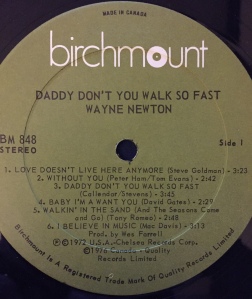
“Love Doesn’t Live Here Anymore” — The record starts out with this ballad and right from the outset mature life is depicted. Marriages break up and midlife proves a challenge. This ain’t kid stuff.
“Without You” — Written and released by Badfinger in 1970, the song became a hit for Nilsson in 1971. Wayne was the third artist to get to it and does it here a year after Harry Nilsson took it to #1. It would go on to be recorded by 180 artists. Wayne employs Nilsson’s arrangement here. Again the theme is loss. This is a good vocal showcase for Wayne.
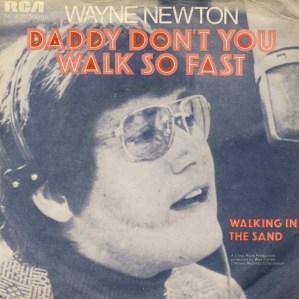
“Daddy Don’t You Walk So Fast” — Written by Englishmen Peter Callander and Geoff Stephens, writers who had success – together and with others – with songs like “How Do You Do It?”, “I Like It”, “I’m Telling You Now”, “Winchester Cathedral”, “There’s a Kind of Hush” and “Daughter of Darkness”. Callander helped launch Paper Lace and wrote “Billy, Don’t Be a Hero” and “The Night Chicago Died” for them. Stephens had discovered and managed Donovan and created the New Vaudeville Band. The title track for this Wayne Newton album was their biggest chart success. “Daddy” was released as a single on April 8, 1972, five days after Wayne turned 30. In the opening of this song, we hear the first example of Mike Melvoin’s fantastic gospel piano. The reed section (Jim Horn, Tom Scott and Bud Shank; legends all) makes a nice contribution. The lyrics again speak of loss, here a breakdown of the family unit. Perhaps history has not been kind to this excellent tune, labeling it schmaltzy. But play it up against Vicki Carr’s previous “It Must Be Him” or Helen Reddy’s later “You and Me Against the World” and Wayne’s song emerges with more substance. I like the sequencing of this title track; third song, side one. The song peaked at #4 US and was #1 in Canada and Australia. It sold a million copies in under three months and was Billboard’s #10 song of 1972.
“Baby, I’m-a Want You” — Written by David Gates and recorded by his band, Bread, this tune was only about three months old when Wayne essayed it. Around that same time, though, it was recorded by many; the Lettermen and Engelbert Humperdinck released two of the five versions that came out in ’72. Wayne’s version is a straight reading of the hit featuring some nice acoustic guitar.
“Walkin’ in the Sand (And the Seasons Come and Go)” — Tony Romeo was a prolific songwriter who worked for Wes Farrell and wrote “I Think I Love You”, the huge #1 song for the Partridge Family. “Walkin’ in the Sand” – given a subtitle so as not to be confused with the Shangri-Las song – had been a moderate hit single for Al Martino two years prior. Another lyric speaking of loss, this one philosophically noting how the passage of time does not always heal wounds.
“I Believe in Music” — Songwriter Mac Davis wrote and recorded this song in 1971. Gallery took it into the Top 40 in August of ’72, some eight months after Wayne recorded it here. This song does not merely contain more of Melvoin’s great gospel piano, it is presented as straight-up gospel, preaching the healing and restorative powers of music. “God loves it when you sing”. Contains a stirring key change. A gospel feel in a song always adds earthiness and soul to the proceedings.
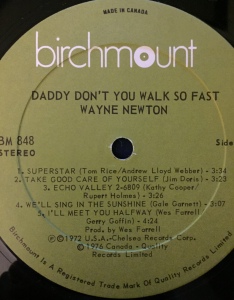
“Superstar” — Andrew Lloyd Webber and Tim Rice presented the musical Jesus Christ Superstar in 1969. Wayne has the voice to tackle this Broadway tune, the title track of the show. This arrangement of Melvoin’s adds funk to the gospel; and, in this case, the “gospel” is inherent in the subject matter, as well. It doesn’t really fit with the rest of the songs on the record but the energy and pomp provides another good showcase for Wayne’s vocalizing. An appropriate start to the second side.
“Take Good Care of Yourself” — Written by Englishman Jim Doris who subsequently suffered from mental illness which may have contributed later to him being struck dead by a bus in London. This is a highlight of this album and may be the best song here. Again, Mike Melvoin shines at the piano. Wayne presents this tune as a real blue-eyed soul, gospel work out. Another rousing key change and stellar work from the brass section accentuate what could’ve been a real shouter in a live setting. Another heartfelt story of loss. There’s a poignancy in someone wishing an ex-lover well even as they walk away.
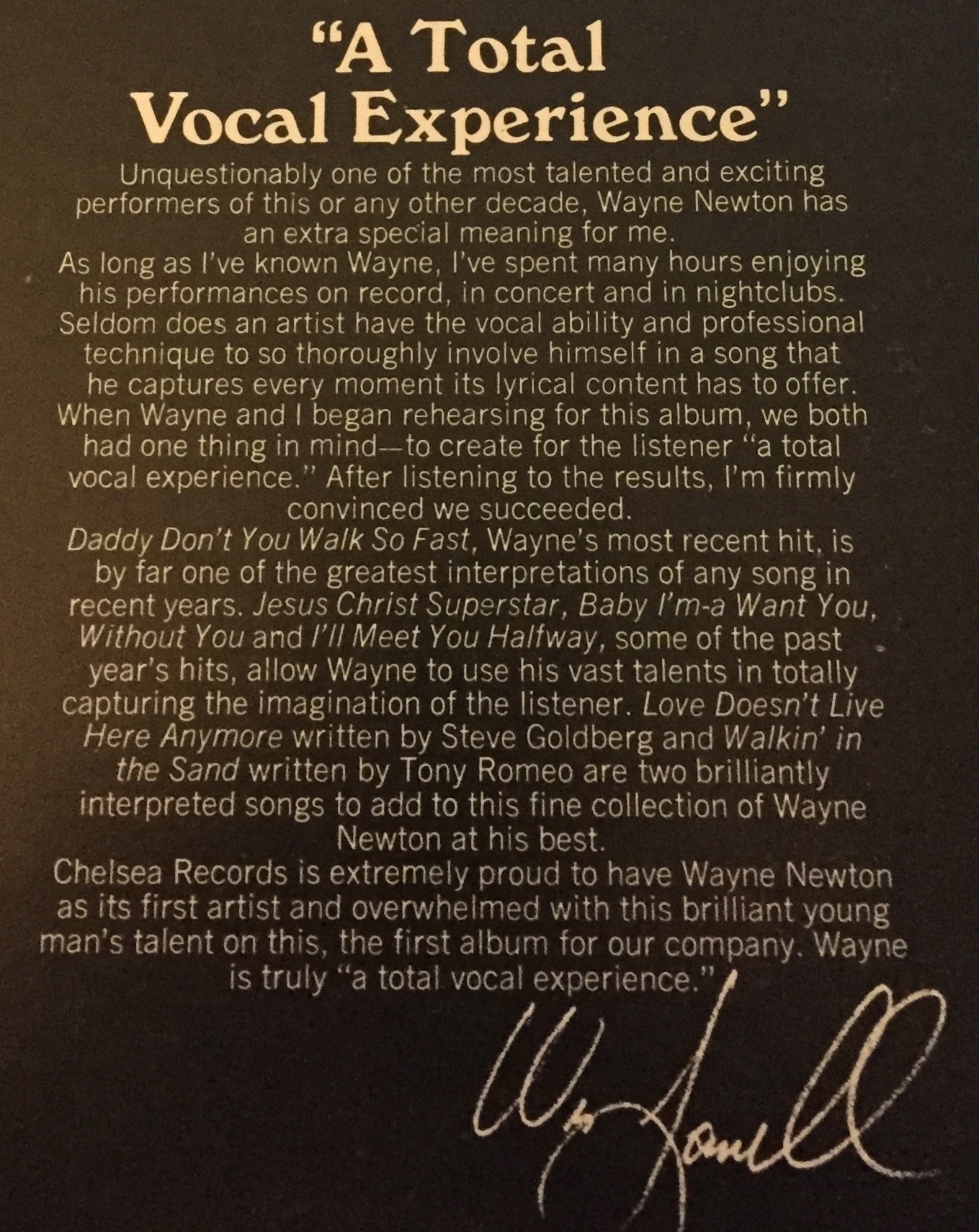
“Echo Valley 2-6809” — Co-written by the prolific Rupert Holmes, who had also worked on The Partridge Family with Farrell. Another nostalgic song of loss. “Been such a long time…” Here’s another tune from the album centred on maturity and middle-age, driving home my point that these songs are not about any kind of rock & roll life. These are songs of real life, suburban life. Wayne sings the title well and the operator’s voice is significant; this phone number, this last link to the past, has been “disconnected”.
“We’ll Sing in the Sunshine” — I’ve always disliked this song. Written and recorded by New Zealand-born Canadian Gale Garnett, who had a major hit with it, placing it high on various charts and winning a Grammy. It’s another of the album’s by rote covers. This most middling of all the “standards” that came out of the mid-’60’s lacks the lyrical depth to be on this album. It’s almost anti-loss. The lyric is too carefree; we sang, had kicks and then I left.
“I’ll Meet You Halfway” — Wes Farrell himself co-wrote this song with the great Gerry Goffin and it had been a Top Ten hit for the Partridge Family the previous year. Goffin’s lyrics fit this album perfectly and provide a sad yet hopeful coda. “I’ve been trav’lin’ in circles such a long time…” It’s all about someday. Things have gone awry – as we’ve seen throughout the record – but maybe we can fix it. It may not be much but I’ll try my best. But we need to work on this together. I don’t have the strength to do it all but I could manage half. I’ll meet you halfway……
Wayne Newton – Daddy Don’t You Walk So Fast (CHL513 – 1972) from Chelsea Records
Produced by Wes Farrell
Hal Blaine, drums; Max Bennett, bass; Louie Shelton, Larry Carlton, guitar; Mike Melvoin, piano; Gary Coleman, percussion; Ollie Mitchell, Chuck Findley, Slyde Hyde, Lew McCreary, brass; Tom Scott, Jim Horn, Bud Shank, sax and flutes. Strings and horns arranged by Mike Melvoin.
Recorded at Western Recorders, Los Angeles, California.
[…] that runs retro TV shows all day. Also, when I reviewed Wayne Newton’s excellent album Daddy Don’t You Walk So Fast, I became aware of Wes Farrell. Wes was a record producer of note in the mid-1960’s and he […]